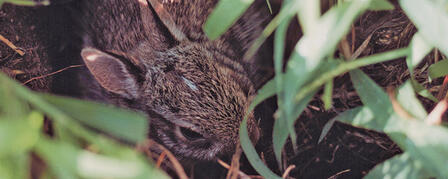DOTING ON YOUNG WILDLIFE CAN BE DEADLY

May 1, 2014
Young animals may appear alone, but that doesn’t mean they’re abandoned
PRATT – Stumbling upon a seemingly-abandoned nest of young cottontails may have you thinking it’s time to make a trip to the store for a cardboard box and some carrots, but this act of kindness may actual kill the very wildlife you’re trying to “save.” Every year, well-intentioned people attempt to “rescue” what they assume to be neglected young, often with deadly consequences. In almost all cases of young wildlife found alone in the wild, the mother is typically feeding nearby, keeping a distant eye on her offspring. When concerned individuals decide to retrieve these young animals and care for them, they are unintentionally giving the young a premature death sentence.
The notion that a young animal found in the wild will die if not given care is wrong. Not only are most young found in the wild not abandoned, picking them up is against the law. The Kansas Department of Wildlife, Parks and Tourism and the Kansas Department of Health and Environment have regulations against such activity that can result in a fine up to $1,000 or more. In addition to legal repercussions, wild animals can pose a number of health risks, including diseases such as distemper, rabies, Lyme disease, roundworms, tapeworms, mites, tularemia and more.
Additionally, if a “rescued” animal were to bite someone, it must be put to death and tested for diseases. Even if they don't bite, the young usually fail to survive in captivity because most people are not equipped to handle wild animals, especially as they mature. On the off chance the animal does survive in captivity, it typically loses instincts that allow it to survive in the wild.
It is important to remember that although young wildlife may be cute, they belong in the wild. Wild animals cannot legally be inoculated by veterinarians, and few people really know how to care for them.
If you should see a young animal in the wild this spring or summer, observe at a distance and consider yourself lucky. But remember, just because they are temporarily alone, that doesn’t mean they are abandoned.
If you really want to help, leave young in the wild where they were born and belong.
If you find an injured animal, a list of licensed rehabilitators can be found at ksoutdoors.com, by clicking "Services/Rehabilitation."
-30-









